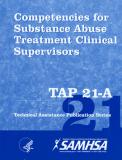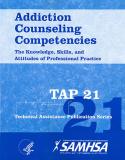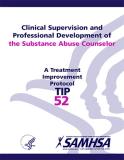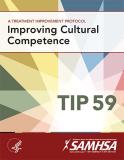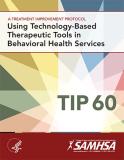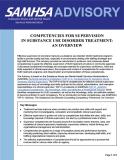
This Advisory is based on Technical Assistance Publication (TAP) 21-A, Competencies for Substance Abuse Treatment Clinical Supervisors. It identifies foundational knowledge and concepts essential for supervisory proficiency, roles and skills expected of clinical supervisors, the purpose and context of competencies for supervision in substance use disorder (SUD) treatment programs, and dissemination and implementation of these competencies.
Units per Product
Download
Advisory: Competencies for Supervision in Substance Use Disorder Treatment (based on TAP 21-A)
File Type: PDF
File Size: 363 KB


